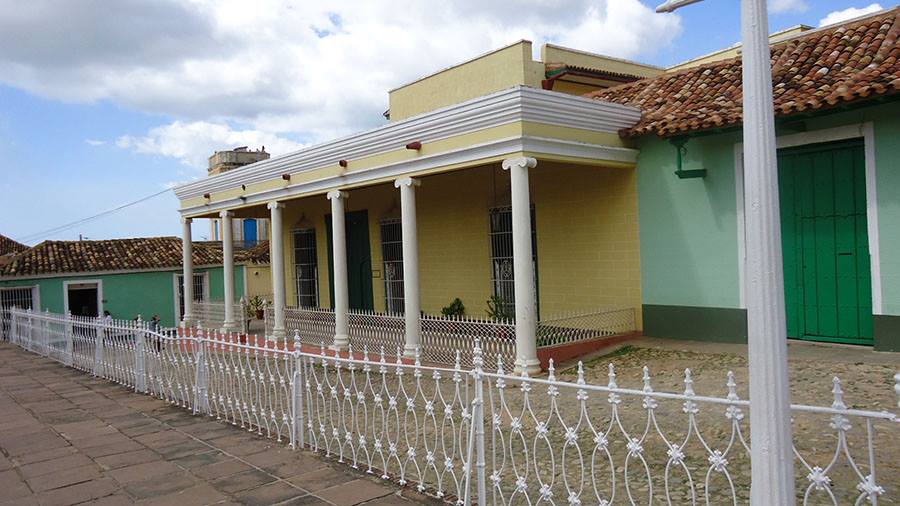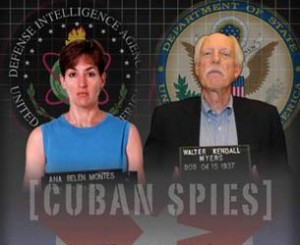Clearly, spying on foreign territory is illegal regardless of the people involved and the reasons why such activity is executed.
The espionage practiced by diplomats and Cuban officials DI (Directorate of Intelligence) on foreign soil and enjoying diplomatic immunity, is known in Cuba as “legal espionage”, these officers are known as “Legal Officers” (OL) and where work centers, located in the Cuban embassy, they are called “Legal Centres” (CL). The CL differ in physical size and logistical, depending on the country in which they are located: the more important the country or geographical area sometimes, more and better equipped will be this CL. Mean “geographical area”, because sometimes, due to the specific operational situation of a country, it is not feasible to have a large CL in the same, this is the case of countries with which Cuba has no diplomatic relations. In that situation, other CL used in neighboring countries, which may not be of great operational importance, as the country with diplomatic ties lacking.
In relation to the United States, something else happens, because even though Cuba has a U.S. Interests Section in Washington, DC, and an office at the UN in New York, who have been for almost 50 years, dynamic espionage centers used by Cuban officials and employees who have diplomatic immunity, is not sufficient for the showdown against a power like the United States. Therefore, traditional Cuban intelligence supported and relies on the CL from neighboring Mexico and Canada to spy on the United States.
… The central structure of the current Directorate of Intelligence (DI) of Cuba, and the role of its departments, is as follows: MI Department for intelligence and CI on USA; Department M-II, devoted to intelligence and CI in Latin America M-III Department, responsible for the strategic intelligence analysis. The MV Department, not only is the most secretive and compartmentalized, but it almost works like a self-direction, with a budget yet unknown head of finance for the DI, who at the same time, it ignores the entire workforce Officers Unlawful ( OI) MV, and its possible location in the world, for the type of coins they handle. Just a select group in DI and in the upper echelons of the Castro regime, know the true numbers and identities of clandestine OI and MV. These OI, highly qualified, are established in the country where they are assigned to fulfill vital missions, manage to pass unnoticed by the domestic IC agencies and also against native citizens of those countries.
Contacts between Legal Officers (OL) and the DI OI, both in Cuba and in foreign territory, are very sporadic, so helpless that would be the second, if OL desertions and betrayals as well as by the fact that in foreign territory, usually, the OL are monitored by agencies of national CI. Hence, they are more common non-personal encounters between OL and OI, using mailboxes, radio communications encrypted messages through third parties with less risk of being monitored, the Internet, and other media. These OI, often exert a citizenry that is not Cuban, despite being born in Cuba, and their identity are as legitimate as those with citizens of the countries from which they claim to be natives, as they were issued by authorities of those countries, as based on their specialized training, able to evade the controls collection. While in Venezuela, Cuban intelligence agents could obtain false Venezuelan passport and identity, the easier: The Venezuelan opposition newspaper editor, “as is”, Teodoro Petkoff, reports that Cuban personnel, has been located by the Venezuelan government in an entity Key: “National Bureau of Identification and Immigration” (Odinex), that since June 2009, is called “Administrative Service Identification, Migration and Immigration”.
Returning to the Department MV DI: in addition to abundant resources and highly trained, nourished through its Operating Officers OI that direct, valuable information from other departments of the DI or the CIM and DIM, among other military and civilian agencies, the Cuban state. In short, the MV Department, is the elite of Cuban intelligence.
Meanwhile, the Department M-VI, is commissioned to industrial espionage and action for breach of the U.S. embargo on Cuba. Alongside them, the M-VIII, is seasoned veterans intelligence officers who have served missions abroad, and engage in outreach to foreigners residing or visiting in Cuba, either to recruit or exclude that are involved in actions against the Cuban government. Thus, the M-VIII is very useful for its intelligence functions or CI. And while the MX is the Headquarters Department of the DI, the M-XI, intercepts international communications, particularly the United States and encrypted radio signals to Cuban agents abroad. The Department M-XV, complex computer programs designed to support communications Cuban agents. At the same time, the Department M-century, used to spy on and infiltrate Cuban communities abroad, the M-XX, handles the protection bodies Cuban embassies, called “Guardian”. Finally, the M-XXV focuses on the European continent and the M-XXX, in Africa.
Sources: Inside Cuba: The MININT “. Ediciones Universal, Miami, 1994/Juan Rodriguez Menier), former official of the Ministry of the Interior (MININT) of Cuba, for 28 years, acting for the intelligence and counterintelligence (CI), Juan Reyes-Alonso (“Cuban culture and its expression in the intelligence services. National Defense Intelligence College. Washington, DC 2009), intelligence specialist and former operating officer of the Directorate of Intelligence (DGI) of Cuba, at a crucial stage (1989-1997).
InternetPhotos/Excerpts/www.thecubanhistory.com
OPERATING AND STRUCTURE OF THE CUBAN INTELLIGENCE.
The Cuban History, Arnoldo Varona, Editor
Trinidad…
Foto Maala Theobalds. – Trinidad City.

ACCIONAR Y ESTRUCTURA DEL APARATO DE INTELIGENCIA CUBANA.
Claramente, el espionaje en territorio extranjero es una actividad ilegal independientemente de las personas involucradas y las razones por las cuales se ejecute dicha actividad.
El espionaje practicado por diplomáticos o funcionarios cubanos de la DI (Dirección de Inteligencia) en suelo extranjero y gozando de inmunidad diplomática, es conocido en Cuba como “espionaje legal”, a esos oficiales se les conoce como “Oficiales Legales” (OL), y a los centros donde trabajan, ubicados en las embajadas cubanas, se les denomina “Centros Legales” (CL). Los CL difieren en su tamaño físico y logístico, dependiendo del país en que se encuentren ubicados: mientras más importante es el país o en ocasiones el área geográfica, mayor y mejor dotado será dicho CL. Refiero “área geográfica”, pues a veces, debido a la situación operativa específica de un país, no es factible que dispongan de un gran CL dentro del mismo; este es el caso, de países con los que Cuba no tiene relaciones diplomáticas. En esa situación, emplea otros CL en países vecinos, que tal vez, no sean de gran importancia operativa, como el país con el que carece de vínculos diplomáticos.
En relación a Estados Unidos, sucede algo distinto, pues no obstante que Cuba dispone de una Oficina de Intereses en Washington, D.C., y una Oficina ante la ONU en Nueva York, que han sido por casi 50 años, dinámicos centros de espionaje usados por funcionarios cubanos y sus colaboradores que gozan de inmunidad diplomática; no resulta suficiente para el enfrentamiento contra una potencia como Estados Unidos. Por ello, tradicionalmente la inteligencia cubana se apoyó y apoya en los CL de países vecinos como México y Canadá, para espiar en Estados Unidos.
…La estructura central de la actual Dirección de Inteligencia (DI) de Cuba, y la función que cumplen sus departamentos, es la siguiente: Departamento M-I para la inteligencia y CI sobre Estados Unidos; Departamento M-II, dedicado a la inteligencia y CI en América Latina; Departamento M-III, encargado del análisis de inteligencia estratégica. El
Departamento M-V, no sólo es el más secreto y compartimentado, sino que casi funciona como una dirección autónoma, con un presupuesto desconocido aún para el jefe de finanzas de la DI, quien a la par, ignora la totalidad de la plantilla de Oficiales Ilegales (OI) del M-V, y su posible ubicación en el mundo, por el tipo de monedas que manejan. Apenas un selecto grupo en la DI y en las altas esferas del régimen castrista, conocen las verdaderas cifras e identidades de los OI y clandestinos del M-V. Estos OI, altamente preparados, se establecen en el país donde son asignados para cumplir misiones vitales, logran pasar desapercibidos ante las agencias de CI domésticas y también frente a los ciudadanos oriundos de esos países.
Los contactos entre Oficiales Legales (OL) y OI de la DI, tanto en Cuba como en territorio extranjero, son muy esporádicos, por lo indefensos que estarían los segundos, en caso de deserciones y delaciones de OL; así como por el hecho que en territorio extranjero, usualmente, los OL son objeto de vigilancia a cargo de agencias de CI nacionales. De ahí, que sean más comunes encuentros no personales entre OL y OI, utilizando buzones, comunicaciones radiales cifradas, mensajes a través de terceras personas con menos riesgos de ser vigiladas, la Internet, entre otros medios. Estos OI, suelen ejercer una ciudadanía que no es la cubana, a pesar de haber nacido en Cuba, y sus documentos de identidad son tan legítimos como aquellos que poseen ciudadanos de los países de donde dicen ser oriundos, pues fueron emitidos por autoridades de esos países, ya que en base a su especializado entrenamiento, logran burlar los controles para su obtención. Aunque en Venezuela, agentes cubanos de inteligencia, podrían obtener falso pasaporte e identidad venezolana, más fácil: El editor del diario opositor venezolano, “Tal Cual”, Teodoro Petkoff, denuncia que personal cubano, ha sido ubicado por el gobierno venezolano en una entidad clave: “Oficina Nacional de Identificación y Extranjería” (Odinex), que desde junio del 2009, se denomina “Servicio Administrativo de Identificación, Migración y Extranjería”.
Volviendo al Departamento M-V de la DI: además de contar con abundantes recursos y personal altamente capacitado, se nutre a través de sus Oficiales Operativos que dirigen a los OI, de información valiosa del resto de departamentos de la DI o de la CIM y DIM, entre otros organismos militares y civiles, del Estado cubano. En definitiva, el Departamento M-V, es la elite de la inteligencia cubana.
Entre tanto, el Departamento M-VI, está comisionado al espionaje industrial y medidas para el rompimiento del embargo de Estados Unidos hacia Cuba. Junto a ellos, el M-VIII, está conformado por veteranos oficiales de inteligencia que han cumplido misiones en el exterior, y se dedican al acercamiento con extranjeros que residan o estén de visita en Cuba, ya sea para reclutarlos o descartar que estén involucrados en acciones contra del gobierno cubano. Así, el M-VIII es muy útil por sus funciones de inteligencia o de CI. Y mientras, el Departamento M-X es la Jefatura de la DI; el M-XI, intercepta comunicaciones internacionales, particularmente de Estados Unidos y emite señales de radio cifradas para agentes cubanos en el exterior. El Departamento M-XV, diseña complejos programas informáticos para apoyar comunicaciones de agentes cubanos. Al mismo tiempo, el Departamento M-XIX, sirve para espiar e infiltrar comunidades de cubanos en el exterior; el M-XX, maneja los cuerpos de protección de las embajadas cubanas, llamados “Custodios”. Finalmente, el M-XXV se enfoca en el Continente europeo y el M-XXX, en el africano.
Sources: Cuba por dentro: El MININT”. Ediciones Universal, Miami, 1994/Juan Rodriguez Menier), ex-oficial del Ministerio del Interior (MININT) de Cuba, durante 28 años, en funciones de inteligencia y contrainteligencia (CI); Juan Reyes-Alonso (“La cultura cubana y su expresión en los servicios de inteligencia. National Defense Intelligence College. Washington, D.C. 2009), especialista en inteligencia y ex-oficial operativo de la Dirección General de Inteligencia (DGI) de Cuba, en una etapa crucial (1989-1997).
InternetPhotos/Excerpts/www.thecubanhistory.com
OPERATING AND STRUCTURE OF THE CUBAN INTELLIGENCE.
The Cuban History, Arnoldo Varona, Editor



 OPERATING AND STRUCTURE OF THE CUBAN INTELLIGENCE * Accionar y estructura del aparato de inteligencia cubana.
OPERATING AND STRUCTURE OF THE CUBAN INTELLIGENCE * Accionar y estructura del aparato de inteligencia cubana.

